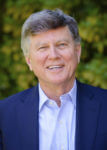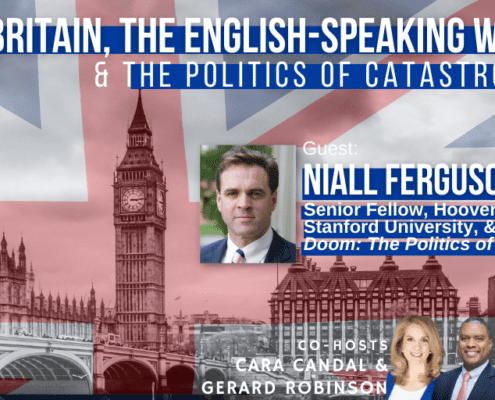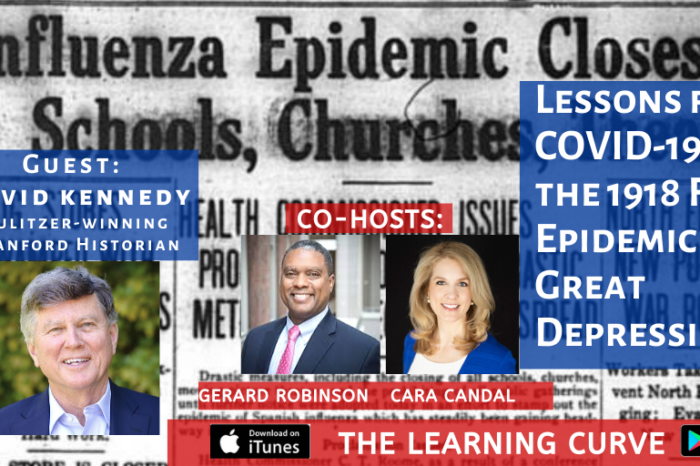Stanford Pulitzer Winner David Kennedy on Lessons for COVID-19 from the 1918 Flu Epidemic & Great Depression
/0 Comments/in COVID Podcasts, Featured, Podcast, rCOVID, US History /by Editorial StaffThis week on “The Learning Curve” Cara and Gerard continue coverage of COVID-19’s impact on K-12 education, joined by Pulitzer-winning historian David Kennedy, the Donald J. McLachlan Professor of History Emeritus at Stanford University. Professor Kennedy describes some of the distinguishing characteristics of the COVID-19 pandemic, compared to the 1918 flu and the Bubonic Plague in terms of rapidity, scale, mortality rate, and death toll. They also delve into differences, such as our society’s technological advancements, that help ease the disruption; governments’ data gathering capacity to fully understand the impact, and ability to mobilize; and the credibility of our leadership and institutions. They explore whether public health crises have received sufficient attention in K-12 history instruction, and what goes unreported in most accounts; and discuss the delicate balance between protecting civil liberties while avoiding the dangers of spreading misinformation.
Stories of the Week: The Florida Virtual School is gearing up to train teachers to deliver over 100 K-12 courses in mathematics, English language arts, history, science, electives, Advanced Placement, and career and technical education to 2.7 million students, at no cost, until June 30. A Gallup survey reveals that 42 percent of parents are concerned about COVID-19 school closures’ negative impact on their child’s education, and 11 percent are not using any educational resources to fill the instructional gap.
Newsmaker Interview Guest:
 David Kennedy is the Donald J. McLachlan Professor of History Emeritus at Stanford University. Professor Kennedy received the Dean’s Award for Distinguished Teaching in 1988. He is the current editor (since 1999) of the Oxford History of the United States series. Kennedy was awarded the Pulitzer Prize for History in 2000 for Freedom from Fear: The American People in Depression and War. His book Over Here: The First World War and American Society explored America’s political, economic, and domestic life during World War I. Kennedy received his B.A. in History from Stanford University and his M.A. and Ph.D. in American Studies from Yale University.
David Kennedy is the Donald J. McLachlan Professor of History Emeritus at Stanford University. Professor Kennedy received the Dean’s Award for Distinguished Teaching in 1988. He is the current editor (since 1999) of the Oxford History of the United States series. Kennedy was awarded the Pulitzer Prize for History in 2000 for Freedom from Fear: The American People in Depression and War. His book Over Here: The First World War and American Society explored America’s political, economic, and domestic life during World War I. Kennedy received his B.A. in History from Stanford University and his M.A. and Ph.D. in American Studies from Yale University.
Tweet of the Week:
Amid Dispute over Charter School Resolution, President of San Diego of NACCP Chapter Suspended by National Board
by @SDUTmcdonald #CharterSchools #SchoolChoicehttps://t.co/DgTNAegX5F
— Choice Media (@ChoiceMediatv) March 30, 2020
The next episode will air on April 10th with guest, Tim Keller, a Senior Attorney at Institute for Justice.
Newslinks
By May, nearly 3 million Florida K-12 students may be using state’s digital district curriculum | Florida | thecentersquare.com
42% of Parents Worry COVID-19 Will Affect Child’s Education
https://news.gallup.com/poll/305819/parents-worry-covid-affect-child-education.aspx
Get Updates on Our Education Research
Browse All Podcast Episodes:

NACSA’s Dr. Karega Rausch on Charter Public School Authorizing

Khan Academy’s Sal Khan & ASU Prep Digital’s Amy McGrath on the Khan World School @ ASU Prep

Hoover at Stanford’s Dr. Niall Ferguson on Britain, the English-Speaking World, & the Politics of Catastrophe

Independent Institute’s Dr. Bill Evers & Ze’ev Wurman on K-12 STEM Education & California’s Woke Math

Oxford’s Prof. Timothy Garton Ash on Poland’s Solidarity, Lech Walesa, & Cold War Lessons for Ukraine

UVA’s Prof. Angel Adams Parham on Classical Education, Black Intellectuals, & Homeschooling

UVA’s Two-Time Pulitzer Winner Prof. Alan Taylor on Thomas Jefferson & Education

Doug Lemov on Teach Like a Champion & Successful Charter Public Schools

William & Mary’s Dr. Charles Hobson on Chief Justice John Marshall, SCOTUS, & Judicial Review

METCO’s Milly Arbaje-Thomas & Researcher Roger Hatch on MA’s Voluntary School Desegregation Program

NYU Law Prof. Richard Epstein on the Founders’ Constitution & Federalism

Engaged Detroit Founder Bernita Bradley on Homeschooling, Urban Education, & Parent-Driven Reforms

Jean Strouse on J.P. Morgan & the Rise of American Finance

Mt. Holyoke’s Pulitzer-Winning Prof. Joseph Ellis on John Adams & American Independence

Lead Plaintiff David Carson & IJ Attorney Arif Panju on Landmark SCOTUS Decision Carson v. Makin

AEI’s Robert Pondiscio on E.D. Hirsch, Civic Education, & Charter Public Schools

Hoover at Stanford’s Dr. Macke Raymond on the Current State of K-12 Education Reform

David Ferreira & Chris Sinacola on MA’s Nation-Leading Voc-Tech Schools

Smith College Prof. Paula Giddings on Ida B. Wells and Her Anti-Lynching Crusade

WV State Sen. Patricia Puertas Rucker on Universal School Choice

Columbia’s Prof. Nicholas Lemann on the Great Migration, the SAT, & Meritocracy

Harvard Law Prof. Cass Sunstein on “The World According to Star Wars”

Hoover at Stanford’s Dr. Eric Hanushek on NAEP, PISA, International Comparisons in Education

Harvard Mathematician Prof. Wilfried Schmid on K-12 Standards & Results

UC-Berkeley Prof. Robert Alter on the Hebrew Bible’s Wide Literary Influence

AFC’s Denisha Merriweather on School Choice Advocacy & Black Minds Matter

UVA Law Prof. G. Edward White on Law, Race, & the U.S. Supreme Court in American History




